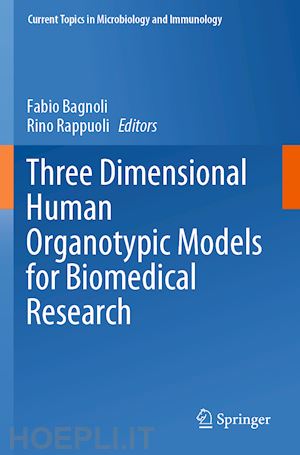
Questo prodotto usufruisce delle SPEDIZIONI GRATIS
selezionando l'opzione Corriere Veloce in fase di ordine.
Pagabile anche con Carta della cultura giovani e del merito, 18App Bonus Cultura e Carta del Docente
This edited volume discusses the application of very diverse human organotypic models in major areas of biomedical research. The authors lay a main focus on infectious diseases, cancer, allergies, as well as drug/vaccine discovery and toxicology studies. Representing a valid alternative to laboratory animals, these models are relevant for most areas of translational research. As the contemporary research shows, many human tissues can today be cultivated in vitro and used for several research objectives.
This book provides an unprecedented overview of recent developments in an exciting field of research methodology. It is a reference guide for scientists in both academia and industry. Readers can update their knowledge and get hands-on recommendations on how to set up an organotypic model in their lab.
Chapters 'Progress on Reconstructed Human Skin Models for Allergy Research and Identifying Contact Sensitizers' and 'Human Organotypic Models for Anti-infective Research' of this book are available open access under a CC BY 4.0 license at link.springer.com.
He earned his PhD in Biological Sciences at the University of Siena, Italy, and was visiting scientist at Rockefeller University and Harvard Medical School.
He is elected member of US National Academy of Sciences (NAS), the European Molecular Biology Organization (EMBO), and the Royal Society of London. Awards received: Gold Medal by the Italian President, Albert B Sabin Gold Medal, Canada Gairdner International Award, European Inventor Award for Lifetime Achievement, and Robert Koch Award. He was nominated third most influential person worldwide in the field of vaccines (Terrapin). He has published more than 700 works in peer-reviewed journals.
He introduced novel scientific concepts: genetic detoxification; cellular microbiology; reverse vaccinology; pangenome. Developed licensed vaccines: acellular pertussis containing a non-toxic mutant of pertussis toxin; first conjugate vaccine against meningococcus C; MF59, the first vaccine adjuvant after aluminium salts; meningococcus B; CRM 197 used as carrier in many conjugate vaccines.
Dr. Rappuoli is among the world scientific leaders dedicated to the sustainability of global health.










Il sito utilizza cookie ed altri strumenti di tracciamento che raccolgono informazioni dal dispositivo dell’utente. Oltre ai cookie tecnici ed analitici aggregati, strettamente necessari per il funzionamento di questo sito web, previo consenso dell’utente possono essere installati cookie di profilazione e marketing e cookie dei social media. Cliccando su “Accetto tutti i cookie” saranno attivate tutte le categorie di cookie. Per accettare solo deterninate categorie di cookie, cliccare invece su “Impostazioni cookie”. Chiudendo il banner o continuando a navigare saranno installati solo cookie tecnici. Per maggiori dettagli, consultare la Cookie Policy.